ARTICLE AD BOX
Tom Bateman
State Department correspondent in Panama

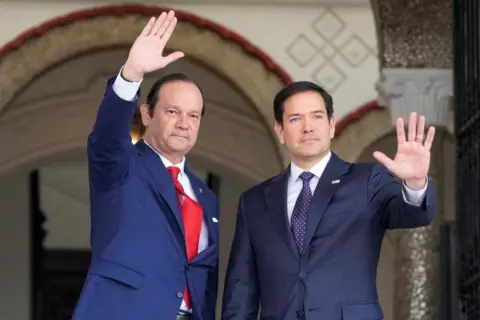 Reuters
Reuters
US Secretary of State Marco Rubio, right, was greeted by Panamanian foreign minister Javier Martinez-Acha on his arrival in Panama City
US Secretary of State Marco Rubio has demanded that Panama make "immediate changes" to what he calls the "influence and control" of China over the Panama Canal.
America's top diplomat said Panama must act or the US would take necessary measures to protect its rights under a treaty between the two countries.
The warning follows President Donald Trump's vow to retake the canal and a meeting between Rubio and Jose Raul Mulino, Panama's conservative president, in Panama City on Sunday.
The two men appeared to emerge from their two-hour meeting with different interpretations.
Mulino told reporters he did not see a serious threat of US military force to seize the canal, saying he had proposed technical-level talks with the US to address Mr Trump's concerns about Chinese influence.
However, Trump's vow to retake the canal has sparked a significant backlash in Panama. Protesters in Panama City on Friday burned effigies of Trump and Rubio.
Riot police moved in on another crowd of demonstrators, firing tear gas and wrestling people away. The clashes were small-scale, but the resistance to the US president's stance is widely felt.
On Thursday, Mulino said the issue of the canal's ownership would not be up for discussion with Rubio.
"I cannot negotiate or even open a negotiation process about the canal. It's sealed, the canal belongs to Panama," he said.
Mr Trump's comments about the canal included an unfounded claim that Chinese soldiers are operating it. He also said American ships were unfairly charged more than others, despite the fact such a practice would be unlawful under treaty agreements.
The waterway is in fact owned and operated by the Panamanian government, under a neutrality treaty signed with the US decades ago. However, Chinese companies have invested heavily in ports and terminals near the canal. A Hong Kong based company runs two of the five ports close to its entrances.
But President Trump's muscular approach - even refusing to rule out military action to take the canal - has aroused a strongly patriotic reaction in the small strategic nation.
"It's ridiculous," says Panama City resident Mari, who asked not to have her surname published.
"There's a treaty that he has to respect, and there's nothing in the treaty that says that we cannot have ports run by the Chinese," she told the BBC, pointing out that there is Chinese investment in American ports and cities.

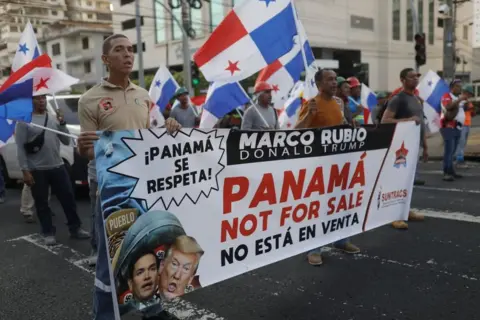 EPA
EPA
Demonstrators came out in Panama City on Friday to protest Rubio's visit
Surrounded by tourists and stalls hawking Panama hats and souvenirs, Mari explained that many residents have strong memories of US control of the canal and don't want to go back.
The US and Panama signed a treaty in 1979, starting a handover process that saw Panama take full control of the canal in 1999.
"We could not cross into the canal zone without being arrested if we didn't follow all the American rules. The minute you stepped across that border, you were in the United States," Mari said.
"We had no rights within our own country, and we will not put up with that again… We are very insulted by [Trump's] words."
For some, Trump's refusal to rule out the use of military force has also triggered suspicion and fear. It evokes memories of the 1989 US invasion of Panama to depose de facto ruler General Manuel Noriega, a conflict that lasted several weeks and rapidly overwhelmed Panamanian forces.
"I was the political leader of the opposition when Noriega said he was going to kill all the leaders of the opposition if the US were to invade," recalled former Panama congressman Edwin Cabrera, speaking to the BBC by the locks of the canal's Pacific entrance.
"I heard the bombs and started seeing people dying… The only thing President Trump and Rubio have left to say is that they will invade us," he told the BBC. "I wouldn't like to live that again in the 21st Century, relive the imperial experience. Panama is in the middle of war between two powers, the USA and China, while we are looking at the sky."

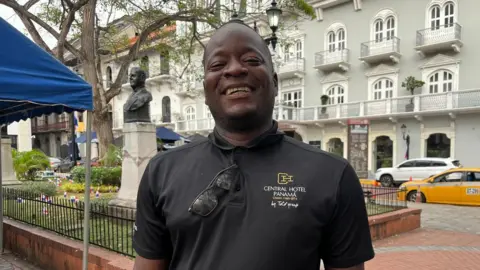
Hotel worker Andre Howell says Panamanians don't see enough of the benefits from the Panama Canal
Marco Rubio is the first Hispanic Secretary of State and is well known for his hawkish positions on some leaders in the region and on China. While Panama closely co-operates with the US on many issues, Mr Rubio's visit is meant to signal the administration's intolerance of countries soaking up Chinese investment in what the US sees as its own backyard.
In Panama, he claims China could ultimately use its interests at the ports to block US merchant or war ships in the event of a conflict or trade war.
"If China wanted to obstruct traffic in the Panama Canal, they could. That's a fact… That's what President Trump is raising and we're going to address that topic… That dynamic cannot continue," Mr Rubio said on Fox News last week.
Despite the overwhelming support among ordinary Panamanians for their country's ownership of the canal, some remain sceptical of their own leadership, arguing profits from the waterway don't filter through to enough ordinary Panamanians.
"What you see here - that the United States and Donald Trump want to take back the canal - that's what we call cause and effect," says Andre Howell, a hotel worker in the historic centre of Panama City.
"They're not administrating the Panama Canal the right way... No Panamanians have [the] benefits," he said.

 3 hours ago
1
3 hours ago
1
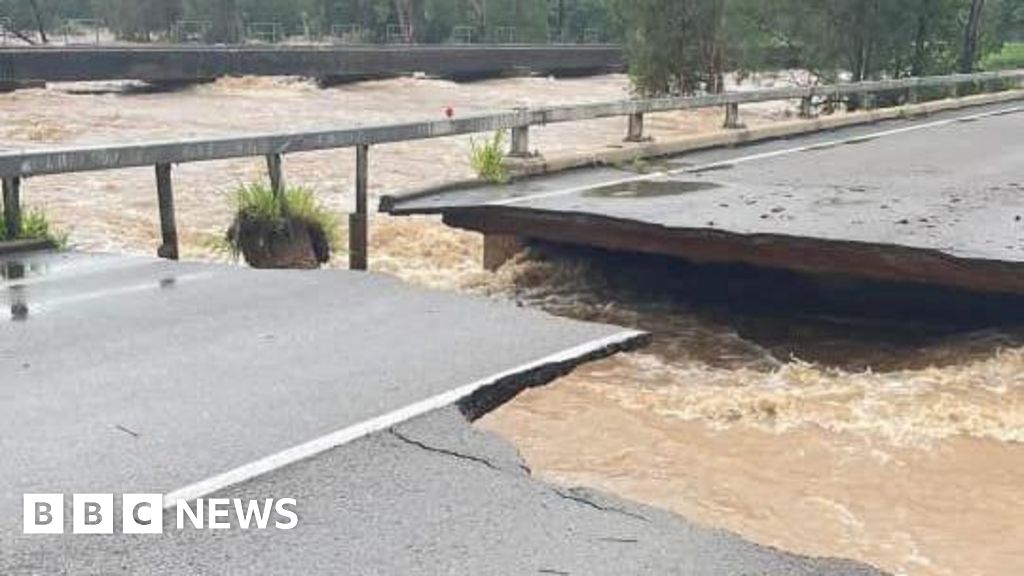
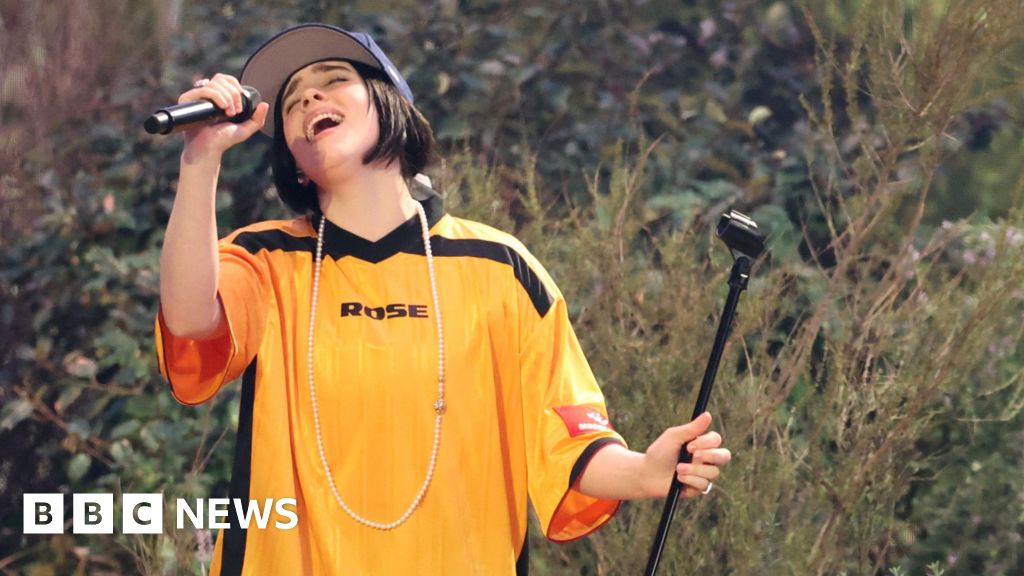
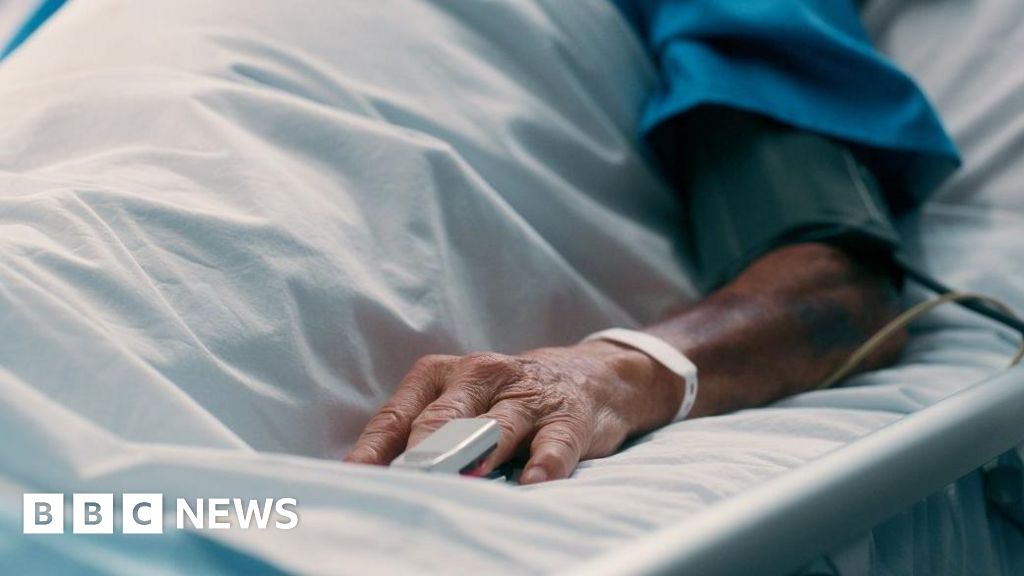





 English (US) ·
English (US) ·